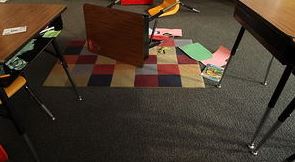 School ends in our district in one more week. And for the first time in 13 years I have not secured a camp or daycare for my child. I know the statistics, I used to quote them when I ran a summer youth program. Drug and alcohol use in teens increases by 40 percent during the summer months. Crimes committed by and against teens increase in the summer months and unstructured, unsupervised time can lead to increased sexual experimentation.
School ends in our district in one more week. And for the first time in 13 years I have not secured a camp or daycare for my child. I know the statistics, I used to quote them when I ran a summer youth program. Drug and alcohol use in teens increases by 40 percent during the summer months. Crimes committed by and against teens increase in the summer months and unstructured, unsupervised time can lead to increased sexual experimentation.
Still, as I watch my gangly soon-to-be-8th grader strum his guitar and shoot hoops at the corner, I remember my own long summer days spent lazing around, sleeping in and ruling the alley-ways with my friends. Nobody we knew then ever went to camp. And so I’ve agreed to an unstructured summer.
Junior High and High School schedules with early morning start times, shortened lunch periods that barely leave time for eating much less socializing, and no recess deprive developing teens of the rest and downtime they need for much of the school year. Summer offers a chance for them to relax and replenish their physical and mental energy.
With a few basic guidelines, parents can reduce the potential risks of summer freedom without limiting the independence and choice that is so important to this age.
- Set basic rules for the summer: Involve your teen in setting mutually agreed upon curfews and house rules, along with reasonable and enforceable consequences if they are not met.
- Have planned ‘check-ins’ daily: Require your teen to phone, text or send a photo at key points during the day to let you know where they are and how you can reach them.
- Know your teen’s friends and their parents: The rule at my house is nobody in the house when I’m not home and my child cannot go into another child’s house until I have met or spoken with the parents. Be sure to get parent phone numbers to help verify that everyone is where they say they will be.
- Reserve time for family: Although it may not often seem that way, most teens still want some connection with family over the summer. Make a dinnertime or weekly family outing day part of the requirement for less oversight during the rest of the week.
To encourage some productivity, I have agreed to match a portion of any money my child makes babysitting or doing odd jobs this summer and to pay him for any volunteer work he is interested in exploring. I also required him to identify one new skill he intends to pick up over the eleven weeks. He is currently intending to build a guitar from a kit.

 ip deepens.
ip deepens.
